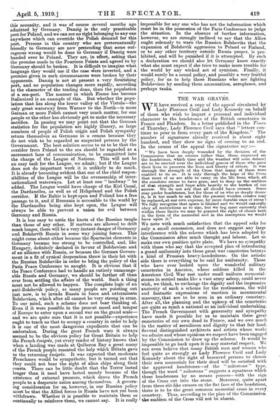THE WAR GRAVES.
WE have received a copy of the appeal circulated by Lady Florence Cecil and Lady Kennedy on behalf of those who wish to impart a personal and individual character to the headstones of the British cemeteries in France and Flanders. In a letter published in the Times of Thursday, Lady Florence Cecil says that letters con- tinue to pour in from every part of the Kingdom." The number of signatures already received is about eight hundred, and they show no signs of coming to an end. In the course of the appeal the signatories say :- " We have been deeply wounded by the decision of the Commission that no crosses (other than those engraved on the headstones, which time and the weather will soon deface) are to be erected over the individual graves of those who gave their lives to preserve the lives and liberty of others. It was through the strength of the Cross that many of them were enabled to do so. It is only through the hope of the Cross that most of us are able to carry on the life from which all the sunshine seems to have gone, and to deny us the emblem of that strength and hope adds heavily to the burden of our sorrow. We do not ask that all should have crosses. Some may prefer headstones, but for those of us who so deeply desire it, is it too much to ask that the present wooden crosses may be replaced, at our own expense, by more durable ones of stone ? We fully recognize that space is limited end we would naturally obey all restrictions as to size, but we beg most earnestly that within these limits we may he granted rho right of choice both in the form of the memorial and in the inscription we would have upon it."
We note with much satisfaction that the appeal asks for only a small concession, and does not suggest any large interference with the scheme which has been adopted by the Commission after much thought and labour. Let us make our own position quite plain. We have no sympathy with these who say that the accepted plan of introducing a grand uniformity into these great war cemeteries betrays a kind of Prussian heavy-handedness. On the artistic side there is everything to be said for uniformity. Those who have ever looked upon the wonderful military cemeteries in America, where soldiers killed in the American Civil War rest under small uniform memorial- stones in serried ranks like a vast army asleep, could never wish, we think, to exchange the dignity and the impressive austerity of such a scheme for the restlessness, the wild and fantastic expressions of emotion in monumental masonry, that are to be seen in an ordinary cemetery. After all, the planning and the upkeep of the cemeteries are quite as much a national as an individual undertaking. The French Government with generosity and sympathy have made it possible for us to maintain these great cemeteries of our own dead in France, and we owe much in the matter of seemliness and dignity to that fair land. Several distinguished architects and artists whose works we admire and whose opinions we respect have been engaged by the Commission to draw up the scheme. It would be impossible to go back upon it in any material respect. We can even believe that many British men and women who feel quite as strongly as Lady Florence Cecil and Lady Kennedy about the right of bereaved persons to choose their own memorials for their dead will be satisfied with the approved headstones—of the " milestone " type, though the word " milestone " suggests a equatness which these headstones by no means possess—with the sign of the Cross cut into the stone. Moreover, quite apart from these slit-like crosses on the flat face of the headstone, there is to be the great common memorial cross in every cemetery. Thus, according to the plan of the Commission the emblem of the Cross will not be absent. But when we have made all these admissions we still feel that they are no answer to the immeasurable craving of persons who desire to erect an actual cross instead of a flat stone above the few feet of ground in winch their dead rest. The answer that any kind of memorial which the relations choose can be erected in the parish church at home is really no answer. The grave itself is the place to which all thought directs itself, around which all sacred memories cluster. It therefore seems to us that if enough people think with Lady Florence Cecil and Lady Kennedy it would not be right, and it would not indeed be possible, for the Commission to resist their plea. What is proposed by way of a compromise would not really interfere with the grand uniformity of the accepted scheme. The crosses would be of the same height as the flat headstones. The Commission might also make restrictions as to the material to be used, and they might perhaps require relations to choose from several approved models of crosses. As for the inscriptions on the headstones, whether these be crosses or flat stones, we recognize that there must be a limitation of length, as on small stones nothing is more disfiguring than huddled lettering. But with this stipulation we would not impose any more censorship than the censor- ship of seemliness which governs every English church- yard. It is still open to those who wish to sign the appeal to do so. They should communicate with Lady Florence Cecil, Barton Place, Exeter. On the number of the signa- tures received the issue will depend.







































 Previous page
Previous page